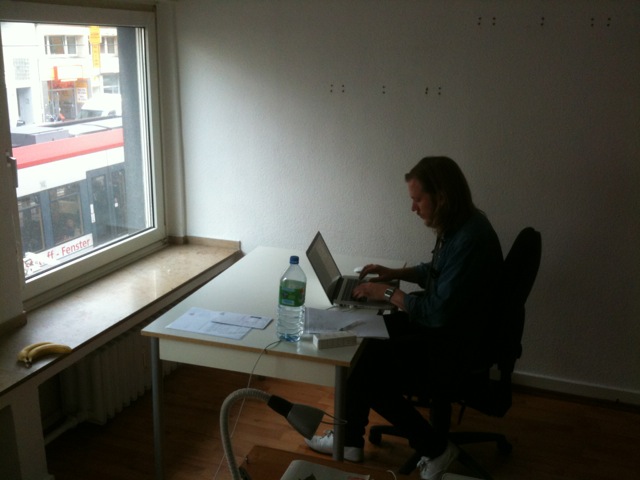
5 Pragmatic Tips for Creating Company Core Values
Sometimes I think I'm getting on everyone's nerves. I'm often talking to the team about company values, repeating them over and over again in one-on-ones, group meetings, weekly standups, etc.
So I was shocked by what I heard at a dinner some weeks ago. My table partner, a CEO who'd led his company through one of the biggest exits in Germany’s tech scene, told me he didn't feel strongly about company values. They had never articulated any.
It seems that just like people don't need values to survive, companies don't need them to make profits.
But after some pondering I realized I wouldn't want to go back to a 'value-less' situation within Userlike. I believe our values have made us a better company in multiple ways.
- Setting expectations. Whether it's hiring, firing, or praising, an articulated set of values gives clarity to the team. Everyone knows what's expected of them.
- Culture. Pure monetary incentives alone aren't enough for talented people to sacrifice their time. Salaries at Userlike don't compete with Google or the Big Four, yet high potentials still choose us because of our culture. Values are the key to engineering and nourishing such a culture.
- Collaboration. We realized soon after our first hires that the underlying values of our founding team weren't self-explanatory. Explicitly talking about them with new teammates made working together much easier.
Still, I do get the scepticism about 'company value talk'. To pragmatic minds, such talk quickly smells like hot air. I'm one of those sceptics, really. That's why I wanted to share the practical tips I'd share with myself when I started thinking about values.
1
Avoid empty words
You know the stereotype startup walls filled with fancy words. Accessibility; dignity; entrepreneurship; humility; excellence; yada-yada.
Such values are so universal that they can only be ignored as empty shells. Because they are everyone's values, they don't shape what is unique to your company.
I assume they're put there with the best of intentions, but they also mostly amount to nothing more than lip service. Take Enron. Its values were drawn ad-absurdum. Communication. Respect. Integrity...
Our colleague Michael worked for a company that claimed to value entrepreneurship . Sounds good, right? But now imagine a company in which everyone acted like an entrepreneur, from the CEO to the cafeteria chef. Values should apply to all in the company.

Values also lose their meaning as they increase in number. It makes things too complex and prevents people from making sense. Look at your unique company and situation, your unique challenges. Then draw a small powerful set of values from there. Leave out what doesn't leads you to a certain goal.
2
Base your values on the past
Did we start off with Userlike thinking about values at first? No way. We didn't even have a clear mission. Our start in 2011 was lean and pragmatic. My co-founder David would build and I would sell.
Spending time philosophizing about values would have been ridiculous at this point. That didn't change when Peter and Pascal joined the starting team.
For sure the four of us had a arguments about working styles and what Userlike should be like. In retrospect, this was the time that defined our core values of today.

We only realized the need for values when we started hiring more people. It wasn't until the end of 2014 when we opened our first office in Cologne, Germany, and started to write down our mission and values.
Those values are based on what had worked for us so far — by looking back. I realized that was really the only way we could set them up, because values are only credible when they're aligned with the reality in the company.
So what are those retrospective values of ours?
We're a bootstrapped startup. Limited capital and human resources forced us to work in certain ways, and those are reflected in our values.
Action Mentality. We don't have time to waste. We've always lacked behind our big competitors in capital and manpower. So we needed Doers. Doing, experimenting, and improving have been key to our success so far.
We value a 'Getting things done' mentality. People who don't wait to be told what to do, who convert theory into actions. We can't micromanage every employee, so we divide ownership among our team.
We ask everyone to take responsibility over their tasks as if it was their personal fight to get the best result.
We value people who not only get done with tasks they created for themselves, but who have an eye for what needs to be improved at Userlike, come up with a solution, and do it. People that don’t wait to be told what to do. That never feel like it's "not their job”.
Efficient working style. We could never spend a whole lot on development, marketing, or other activities. We've had only our product’s revenue — and believe me, the dry spell lasted for quite a while — and no venture capital.
These resource constraints made us mindful about our work. We had to be as efficiently as possible . Dump the excess, focus only on the important stuff. Question your ideas about what to do more thoroughly. Your focus gets razor-sharp out of necessity.

Looking for better customer relationships?
Test Userlike for free and chat with your customers on your website, Facebook Messenger, and Telegram.
Read moreGrowth Mindset. Pascal and me had almost no work experience when we started Userlike. We didn't know about software, marketing, sales, or customer service. David was an experienced developer, but he also had to work with a whole bunch of new technologies. Rapid learning was the only way forward.
We tried out, failed, and learned. We kept on learning and improving. This growth mindset developed into the third core value at Userlike.
We believe this lifetime learning approach is good for the company, but also for each individual employee. It's fulfilling to learn new things and overcome challenges.
We want this feeling for everyone in our team. We see it as our responsibility to create a strong learning environment. It improves the quality of our work, for example in content marketing or product management, but also allows the employee to blossom.
3
Integrate in all communication
Being forgotten is another way for your core values to lose credibility. That's why I'm repeating them to the point of annoyance. At least my team knows I stand behind them.

So inweave your value communication in every possible format, like interviews, standups, 1-on-1's, quarterly reviews, Christmas Dinner speeches, or blog posts.
If you feel awkward speaking out loud about your company core values, that's a hint that they're either not actionable enough or don't relate to everyone.
4
Back up your words
Values turn into culture when words turn into behavior. To make everyone feel the values, we aim to make them come back in our actions and processes .
Hiring. This is the earliest place to start with value indoctrination. We already communicate our values in the job ads we put up, and then use them as criteria to select applicants for interviews. In these interviews we again stress these values to set expectations. When people start at Userlike, our values should already be known to them.
Silence time. To support our values of efficiency and Getting-Things-Done-mentality , we started a 3-hour daily silence time. From 09:30 until 12:30 (lunch), everyone focuses fully on their own work. No meetings or discussions, just pure productivity. If you have something to discuss with a teammate, you make a note of it and discuss it after lunch.

We see it as our responsibility to offer a work environment in which our team can excel. Interruptions — however well-intentioned — often get in the way. This policy offers everyone a few hours of pure productivity every day.
Educational Budget. To support the value of personal growth, we introduced an educational budget for every Userliker. It can be used for (e-)books, magazine subscriptions, (online) courses, conferences — anything that brings you forward.
Userlike library. Because of the way we delegate ownership, every team member has her personal area of expertise. To support our personal growth value, we've started the Userlike Library . Everyone can contribute and borrow books and magazines. A random selection of books from our library: Behind the Cloud , Practical Vim , The New Rules of Marketing and PR , and LeanUX .
UserlikeThursdays. This is a quarterly team event during which a couple of team members give a lightning talk on a topic of their interest. This can be anything broadly related to Userlike: material design, machine learning, productivity tips, or trending topics like chatbots.

We intended UserlikeThursday as a platform for exchanging the know-how we all possess in our areas of interest. But it also helps everyone recognize the work and expertise of their colleagues. We usually connect it with pizza, drinks, and a wonderful time.
Afghani Girl School. Inspired by Salesforce's 1-1-1 model , we wanted to give back to society as well. We decided for a cause that we were in personal contact with, of which we knew exactly how the resources would be used, and which connected to our value of Personal Growth as well : the Atefa-girls’ School in Afghanistan.

5
Carve out your values in mud
Up until today we've only have three core values, but this will change in the future. When I started writing down our values, I somehow assumed that they would have to stay with us all the way.
But that's nonsense. Each of the company's growth stages brings unique challenges. Obstacles and environment change, the dynamics in the company change. You can always rethink whether your core values still capture the scope of what needs to be done and decided.
What do you think about our values approach? What are your experiences with company values? Do you agree with me that company values should stay adaptive and be open for change? Let me know via @timoort .
This post contains affiliate links. As an Amazon Associate, Userlike earns from qualifying purchases. We donate all of these proceeds to our non-profit cause, the Atefa Girl's School .

